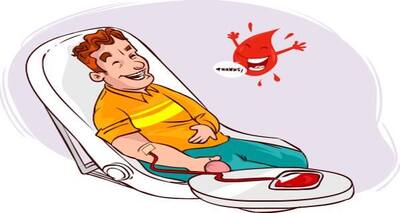Don’t Miss Out on the Latest Updates.
Subscribe to Our Newsletter Today!
5 myths on blood donation busted

The theme for World Blood Donor Day 2015 is "Thank you for saving my life". So if you want to save a life, but have many doubts about falling ill or catching a disease, find out more.
India faces a blood deficit of approximately 30-35 percent annually. The country needs around eight to ten million units of blood every year but manages a measly 5.5 million units. As per WHO standards, India's demand for blood and blood components should be one percent of the total population. The shortage seems largely due to the misconceptions and myths surrounding the noble act of blood donation. Here are 5 such major myths and the corresponding facts:
1. If I donate blood I am susceptible to contract diseases like HIV
No, that is not true. The Central Drugs Standard Control Organisation (CDSCO) and state licensing authorities issue various licenses for import, manufacture, sale and testing of blood. It also issues certifications like GMP (good manufacturing practices) as per WHO norms. Apart from this the ministry of health has laid down rules for blood banks, where the state Drug Controllers are authorized to issue certificates based on the quality of their service.
Also Read
Therefore during a blood donation drive, the organization carrying out the drive, will make sure they follow all the proper precautions to ensure your safety like using disposable needles etc. Since diseases like HIV can spread only through direct transmission, a fresh, sterilized needle will keep you safe. To be sure, you can ask the technician to open the sealed pack containing the needle in front of you, and dispose of it in a portable incinerator.
2. I suffer from diabetes, I cannot donate blood
Not true again. If you are on oral medication for diabetes and are not insulin-dependent, you are a good candidate to donate blood. All you need to do is keep a few of these parameters in mind before you donate. You should not have donated blood for at least 56 days, and should be generally healthy. If you suffer from high blood pressure or any other heart disease, make sure to consult your doctor before you donate blood.
3. I have already donated blood once this year, I can't donate again
According to Dr Sabhyasachi Bal, pulmothoracic surgeon at Fortis, 'A voluntary donation is the best thing that one can do because it will help the medical community in treating patients who are in need. One of the most common myths which acts as a hindrance in blood donation is that 'blood donation weakens either the health or is harmful for the health', this is not true at all ; if people donate blood , their blood is made up within 7-14 days. One can donate blood every three-six months.'
4. I am a woman, I can't donate blood
According to statistics,94 percent of blood donations in the country are made by men while women contribute onlysix per cent. Being a woman does not hamper your ability to donate blood. Although, due to physiological factors, women may be more prone to conditions such as anaemia, pre-donation counseling will help you decide if you should or shouldn't donate. Dr. Anju Verma, Chief Medical Officer at Rotary Blood Bank says, 'The percentage of Indian women donating blood is low as they are deferred due to physiological problems. Most of them have a low hemoglobin count and fail to meet the minimum requirements to donate blood and hence the percent count is low.
70 percent of blood in our body gets utilized for various bodily functions, rest 30 percent is initialized, if we take out 350 or 450 ml of blood, it will not hamper any bodily functions. Pre donation counseling is very important to check the problem of low blood donation in India.'
5. If I donate blood, I will fall ill
Blood donation does not make people ill. Yes, after you donate, you might feel a bit dizzy but that can be taken care of by including certain foods in your diet before and after you donate. Annapurna Agrawal, a nutritionist at Snap Fitness India says, ' Before you donate blood, make sure you include iron rich foods and foods that contain Vitamin C into your diet. Also, make sure you have enough fluids before and after you donate. This will help keep the body hydrated and reduce any weakness you might feel after. After you have finished donating, make sure you have foods that contain folic acid, vitamin B6 and B2. These foods contain components that will help raise your hemoglobin levels.' She also advises people to stay away from carbonated drinks and fatty foods for 24 hours before blood donation. Fatty foods tend to increase the fat content in the blood, making it unfit for pre-donation testing.
Your blood might help save a life! Watch this --
You may also like to read:
- Facts you should know about blood donation
- 10 facts you must know about blood transfusion
- People donate rare 'Bombay blood group' blood to give ailing UP infant a second chance at life
Image Source: Shutterstock
For more articles on diseases & conditions , visit our diseases & conditions section. For daily free health tips, sign up for our newsletter.


